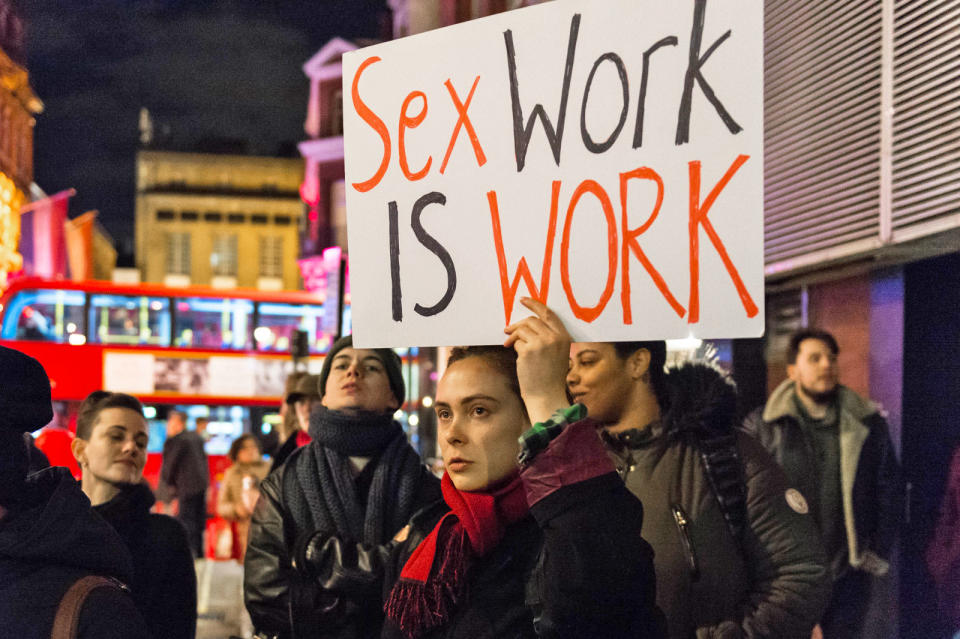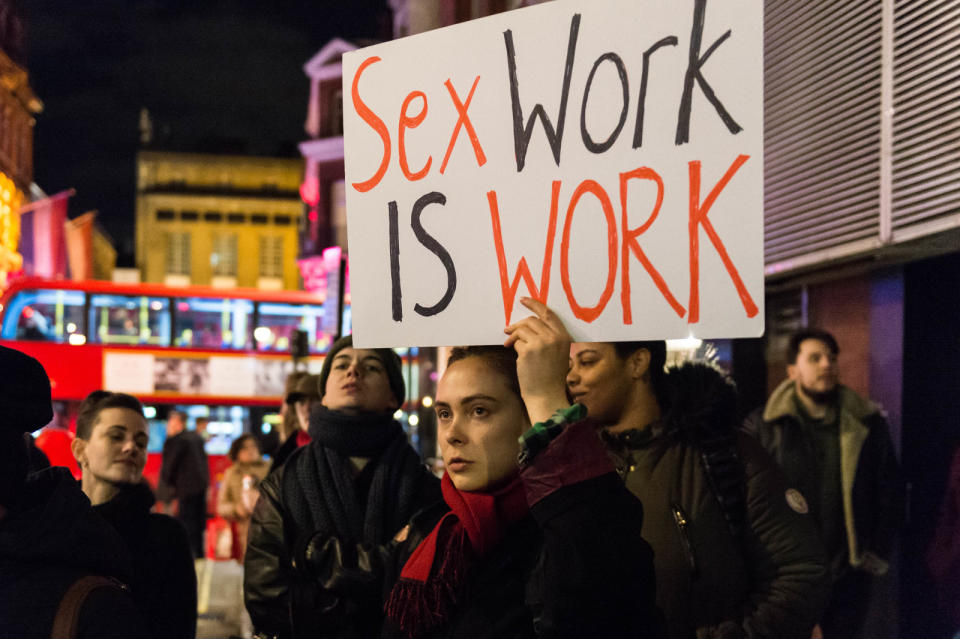FOSTA-SESTA's real aim is to silence sex workers online
Under the cover of trafficking, sex workers are being silenced.
The US' latest attempt to silence sex workers and people working in the adult-entertainment industry has been a huge success. Just weeks after FOSTA-SESTA was passed, the bill has begun to chill free speech across the internet. A number of websites have had to either shut down or actively distance themselves from the notion that they support sex work. And the problem is only going to get worse as time goes on.
If you're unfamiliar, the Fight Online Sex Trafficking Act and the Stop Enabling Sex Traffickers Act were two bills welded together on Capitol Hill. The legislation passed the House on March 21st and was signed into law by President Donald Trump today. Its job is to neuter the safe-harbor provisions contained in Section 230 of the Communications Decency Act 1996 with regards to sex.
Historically, if you owned a platform, then you weren't responsible for the behavior of your users. An ISP couldn't be held liable if one of its customers sent threatening messages to someone else, because it would be too onerous to police. Subsequent case law enshrined its principles, with courts finding that companies like Google and Backpage.com were not liable for the actions of its users.
Intentionally or not, the bill makes no distinction between human trafficking and legitimate, consensual sex work. As such, FOSTA-SESTA essentially makes platform holders liable for talk about sex on their platforms. As my colleague Violet Blue wrote, "Lawmakers did not fact-check the bill's claims, research the religious neocons behind it, nor did they listen to constituents." That's not to mention that FOSTA-SESTA contravenes the First Amendment's protection of free speech.
The fallout has been dramatic, with the website Survivors Against SESTA documenting the litany of changes that have taken place. This includes the closure of sex-work directories like CityVibe and NightShift as well as the personals sections of websites like Craigslist. FetLife's kink-friendly social network is currently consulting with its users to determine its future plans. The FBI's seizure of Backpage.com has, again, helped blunt a useful avenue for sex workers to find work.
It's not just the realm of adults-only websites and platforms that are now having to crack down on discussions of sex. Microsoft and Google have moved to alter their terms of service to prohibit offensive or inappropriate content and language. Not even private discussions are safe, with Microsoft reportedly claiming the right to examine your content to investigate complaints.
More troubling is the fact that according to Motherboard, Google is purging adult content from private Drive accounts. Performers who sell clips of explicit material to users have lost videos and received complaints from customers. Even videos with relatively anodyne names have been wiped or left in place but made unable to play, a troubling infringement of personal rights.
Even before the legislation was passed, however, the technology industry had begun to wage a war on sex workers. Last year, Patreon flip-flopped on moves to prohibit sex workers from earning money through the site. That wound up potentially harming a number of sex workers who were economically vulnerable and relied on the site for income. Similarly, Nook, Barnes & Noble's e-book publishing platform, began terminating the accounts of erotica writers without warning last summer. A common thread with many of these moves is to strip an often-marginalized group of its ability to make money.
Twitter, meanwhile, stands accused of shadowbanning users who are engaged in sex work or the wider adult-entertainment industry. The practice essentially restricts people's messages and profile from being surfaced beyond their own network -- for instance, making sure their tweets cannot be seen in hashtags and preventing new people from discovering their account. Twitter vehemently denies engaging in the practice, and there is no concrete evidence that it does so.
There is clearly something going on, however, as various adult performers have found their accounts censored. One of the more high-profile adult performers to believe that they have been shadowbanned is Stormy Daniels. On April 6th, she tweeted that it was now impossible to find her account even when searching for her username. There are tools, such as Nice Brains' Shadowban Checker, that purport to determine if an account has been shadowbanned.
But even if Twitter isn't shadowbanning users, it is still doing its part to silence women within the sex industry. Accounts can either be marked by the users themselves or moderators as containing "sensitive content." Like the effects of a shadowban, these accounts won't appear in hashtags or searches, even if you look for their specific username. This sensitive-content filter is also activated by default, thereby erasing and silencing these individuals without having to give them an official ban.
Firstly: change your settings. In 'privacy and safety', scroll down to safety and untick 'hide sensitive content', tick others you'd like. pic.twitter.com/ilMPFH0TJT
— Girl on the Net (@girlonthenet) Oct. 27th, 2017
Some sex workers are attempting to protect themselves against the bill by building platforms beyond the reach of American authorities. One such outfit is Red Umbrella Hosting, an Iceland-based web hosting service founded by Melissa Mariposa. The company was founded in response to FOSTA-SESTA and offers judgment-free, anonymous and sex-worker-friendly hosting.
Then there is Switter (Sex Work Twitter), a Mastodon service created by Assembly Four -- a collective of sex workers and technologists based in Australia. Switter was similarly launched in response to FOSTA-SESTA and Twitter's alleged shadowbanning practices. In a few short weeks, it has already acquired nearly 23,000 followers and is likely to become even more prominent in the future. And then there is Share Our Shit Saturdays, a project whereby sex workers, content creators and activists can provide signal boosts to others.
The current efforts of sex workers to build alternative platforms are a good first step but not the end-all. While their ability to find work and receive payment remains in the hands of third parties, sex workers will always be vulnerable. A simple policy change at Patreon was enough to risk the livelihoods of thousands of individuals engaged in sex work. That's not to mention the uncertainties inherent in a shifting, increasingly right-wing political landscape where crackdowns can happen on a whim. Perhaps the sex-work community will need to build its own social media, advertising and payment platforms in order to truly control its own destiny.
Comments to this article were available for the first 24 hours after publication only, and have since been closed.


